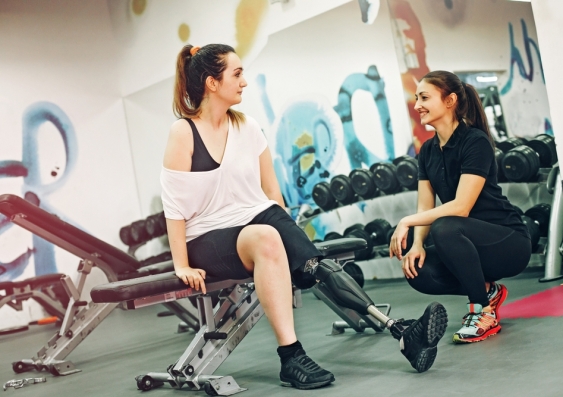How can the NDIS be more effective?
The National Disability Insurance Scheme needs a lot more work for it to be truly inclusive, says Director Engagement of the UNSW Disability Innovation Institute, Rosemary Kayess.
The National Disability Insurance Scheme needs a lot more work for it to be truly inclusive, says Director Engagement of the UNSW Disability Innovation Institute, Rosemary Kayess.

Diane Nazaroff
UNSW Media & Content
+61 (2) 9385 2481, +61 (0)424 479 199
diane.nazaroff@unsw.edu.au
The National Disability Insurance Scheme (NDIS) is a support plan that is tailored to a person with disability. It is widely touted as providing those people with more choice.
Before the NDIS came into effect in 2013, the Commonwealth government funded the states to provide disability support services either directly or through grants to disability service providers. Many people with disability couldn’t access higher education or get a job due to the limits of what the service providers could offer. Many didn’t have a choice about who came into their home to assist them with personal care or what time services were provided.
How does the NDIS improve the lives of people with a disability?
Under the NDIS, people with disability receive an individual budget so they can select their own services. They can choose to receive daily personal support such as help with getting dressed, having a shower and preparing a meal. If they work, a support person can come early in the morning to help them get to work on time.
People with disability now have more input into the members of their support team, so they know who will act as a replacement, or they aren’t left without any support, when their regular support person is away.
Having a choice of services also helps them to participate in the wider community. For example, they can choose from anyone who runs an art class, instead of a specialist disability service provider, or they may use a local auto electrician to fix a power wheelchair.
The upshot is that people with a disability can lead more productive lives under the NDIS and they don’t have to rely so much on their families. And in turn, rather than providing an informal caring role, their families can also lead more independent lives and rejoin the workforce.
Does the NDIS provide support for all people with disability?
The NDIS is designed to promote greater community participation for people with disability in three ways. The first is by providing Individual Support Packages to fund reasonable and necessary supports for eligible people with disability.
Secondly, the NDIS aims to better link individuals to mainstream support services and assist those services to be more inclusive and responsive to the needs of people with disability. Thirdly, it provides public awareness and general information to assist in reducing social constraints of disability by supporting the accessibility of mainstream services.
But disability advocates have concerns that those who may not fall into the first area of individual packages may not be getting enough support in mainstream services. There are also concerns that people with higher and quite complex support needs may not get support, as providers can now pick and choose who to service and state providers have dropped disability as a responsibility.
There are also areas the NDIS doesn’t deal with such as housing. A lack of affordable and accessible housing means people with disability are still living in segregated congregate residential care such as group homes, rather than living independently and participating in the community. People with disabilities will do much better and lead more productive and fulfilling lives outside of group home care.
How can the NDIS be more effective and inclusive?
For the NDIS to be truly inclusive, those administering the NDIS and assisting people with plans need to understand that people with a disability have potential. Currently there isn't a lot of scope within mainstream society to enable people with disability to engage with and participate in the wider community.
For example, without universal access to transport, people need to include transport support and support to access other services in their NDIS packages. If public transport and infrastructure were more accessible and inclusive, they wouldn’t have to include this in their packages.
This situation makes the relationship between the National Disability Strategy (NDS) and the NDIS critical. The NDS is a national plan to foster an inclusive society that enables people with disability to fully participate in the community.
It needs to be implemented so that the broader community is more accessible to people with a disability. Without greater focus and emphasis on the NDS, there will continue to a much greater financial pressure on the NDIS, which threatens its ongoing financial security.